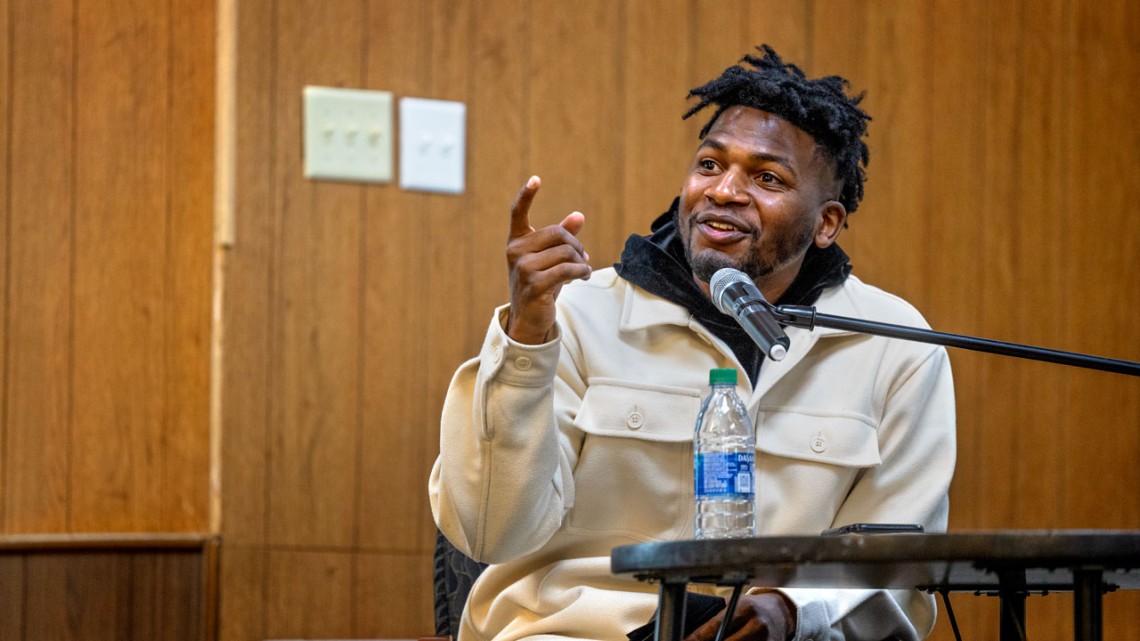
Author Danté Stewart, speaking at Calvary Baptist Church in Ithaca on Feb. 3 as part of Cornell’s Martin Luther King Jr. Commemoration.
MLK speakers: Embrace, occupy your Black stories
By Melanie Lefkowitz, Cornell Chronicle
Telling stories is an act of liberation.
For authors Danté Stewart and Cole Arthur Riley, exploring, documenting, preserving and writing about Black lives has been a way to take control of their own stories, and – paraphrasing James Baldwin, whose epigraph opens Stewart’s first book – a way to push back against “the lovelessness of the world.”
“We know the world that we live in, we know the struggles we have to deal with continually, but also that’s not all we know – we do know love,” said Stewart, author of the debut memoir “Shoutin’ in the Fire: An American Epistle,” who spoke in conversation with Riley for the 2022 Martin Luther King Jr. Commemorative Lecture, held virtually amid a snowstorm on Feb. 3.
“Going back home, going to Black literature, going even to my own self and my own failures – for me, that is where the love was,” Stewart said. “And the love was simply this: Learning from the story of the everyday ordinary power of Black people and the ways we have taken the mundane, the ugly, the traumatic, and even the grand, and we have made it all Black.”
Titled “In Praise of Being Black and Alive,” this year’s lecture, a cross-campus and community partnership aiming to makes King’s life and legacy accessible, was originally planned as a hybrid event based in Sage Chapel. Riley and Stewart – close friends whose debut books share a publisher – touched on topics including their writing processes; the inspiration they found in their families; Black history and literature; Christianity and faith; and what it means to be Black and American.
In interviewing relatives for her own book, “This Here Flesh,” due out Feb. 22, Riley “was reminded how easily stories are co-opted, how easily stories are suppressed, how easily stories become about consuming Black pain. There’s a hunger in a lot of white people after George Floyd, there is a curiosity – I think a sinister curiosity – around Black suffering, and I think [I was] exhausted of that; I want ownership of my story,” she said.
“There’s a lot of liberation in being able to occupy your own story and tell it in your own way, and knowing, at least in my family, those stories haven’t been able to be preserved well, and we have to preserve what we can,” said Riley, the spiritual teacher in residence with Cornell’s Office of Spirituality and Meaning-Making and the creator of Black Liturgies, a space for Black spiritual words of liberation, lament, rage and rest.
“Black people have an oral tradition of storytelling in our families – and also we need to be caretakers of that,” she said. “We need to ask ourselves, who is the historian? Who are we allowing to be our historians, so that we’re telling the truth?”
In writing his book, Stewart said, he found his truth partly by accepting its complexity.
“As I think about the ways many people tell Black stories, we have to be honest about Black history – it’s not a story of triumph, you know, for we failed as much as we loved, and we destroy as much as we liberate, and that’s just the reality of being human,” he said. “We need to embrace the fullness of our stories, and say that if we’re honest with ourselves, if we’re vulnerable, then we will realize that you don’t have to be perfect … in order to be loved.”
There’s power in storytelling, Riley said, but there can be exhaustion in trying to change people.
“We can get caught up in believing it’s our job to reform every space, to represent, to transform people and teach them,” she said, speaking about churches and spirituality. “You really have to become honest about the cost, and figuring out if that is a cost you’re willing to endure, if that is a cost your body is willing to endure.”
Stewart, who played football at Clemson University, also talked about what he learned as a Black athlete – including when, in 2020, some white fans erupted in rage because Clemson football players put symbols on their helmets showing their support of Black Lives Matter.
“Oftentimes, for Black athletes and Black coaches and Black trainers, we’re still seen as products to be used, rather than people to be loved,” he said. “I started to see that not only was my body a product on the field, but my body was a product in the church, in the academy … . So to resist that it meant, for me, that I had to take it back and tell that story from my perspective. I had to first uncover and tell them that, ‘Yo, y’all still treat us as chattel,’ ‘Y’all still treat us as second class and exploit us,’ but also, I had to lean in and say, ‘We contain so much more than you try to make us.’”
The lecture was one of three events Stewart participated in as part of Cornell’s Martin Luther King Jr. Commemoration. Cornell United Religious Work partnered with Calvary Baptist Church in Ithaca to host a conversation with local spiritual leaders about the spiritual virtues needed for working at the intersection of race and religion, and the Office of Academic Diversity Initiatives held a fireside chat with students, who talked with Stewart about topics including racial justice, activism and the Black student experience.
Get Cornell news delivered right to your inbox.
Subscribe
